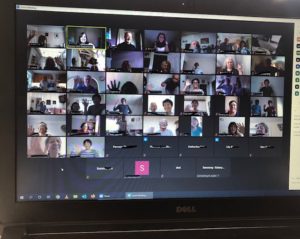I was quite sceptical in the early days of this pandemic about whether my classes would translate online. When I saw other teachers getting straight out there on Zoom or social media I thought that it would really only work for those who already had a big online presence – the Instagram and YouTube generation. I made some offline instruction videos and pointed my students towards useful content that was already ‘out there’ but I couldn’t really see myself teaching classes on Zoom. I didn’t even think that my demographic would be interested in it.
Reader, I was wrong.

The classes I have done so far have been well attended and whilst it’s never going to be quite the same, we have managed to get through a lot of dances and have a bit of fun. It’s been great to bring together students from across all my classes, including people who wouldn’t have been able to attend a face to face class – people in at-risk categories, those who commute into London but are now working from home, some who have moved out of London altogether – and one week we had as many as 60 people dancing together, safely, from home.
Technical problems cropped up in the first few smaller taster classes that I did – my own laptop wasn’t responsive enough and I got a bit of ‘lag’ in my movement, but that was corrected by switching to my husband’s computer which had a higher spec for images. I also bought an extra long ethernet cable to plug the machine directly into the router rather than relying on a wifi connection and a second webcam so that my students had a better view from a distance when I was demonstrating. The spare room, formerly just the place we hid all our junk from the world, became my dance studio.

So, it has now been confirmed that all of my Mary Ward Centre classes, including the outreach classes that usually take place in partner centres, will take place online in the autumn term. This is because, in addition to having to ensure social distancing is adhered to within the lesson, there are also limits on how many people can be in a building at once, the safe access and movement around the building (using the toilets, passing the corridors etc) and cleaning of frequently touched furniture, door handles, equipment etc. The centres have all had to manage a delicate balancing act of what can be run face to face, and classes like dance and exercise which are higher risk than some but can easily be done online, will stay online for this term.
Having had some feedback from students about this, although a few people are more keen to get back to face to face as soon as possible, others (and the majority that I have heard from so far) are happy to remain online for now as they don’t wish to use the tube or be in crowded spaces in order to reach the class. So I hope that we will again see a good turnout for classes online once term starts again in September.
Here’s what’s coming up:
The late summer school, between September 7th – 20th, with one off afternoon and evening sessions which are a great way to try something different before committing to a course or learn some fun choreography. See here for details: http://www.marywardcentre.ac.uk/courses/subject/dance-online/
Full term length courses in my usual subjects:
- Ballroom Improvers (see below for how this will work)
- Latin Line Dance – usually our most popular class
- Gentle Dance and Stretch (the new name for the Tuesday lunchtime class – ideal to get moving without too many steps to remember)
Plus new Freestyle Jazz – a choreography class to a range of music. Get the whole body moving in a fun way. No experience required.
And an eight week Saturday morning course in Swing, Jive & Stroll – this course had just launched with a great group of dancers when lockdown happened and it’s ideal for those who love the steps and the music of Rock ‘n’ Roll, Swing dance or Jive but these routines are designed to be danced solo so no partner needed.
See here for details of all the term time dance options (scroll down underneath the singing classes): http://www.marywardcentre.ac.uk/courses/subject/dance-singing-performng-autumn/
With the exception of ballroom, all of these subjects are designed to be danced solo so little adaptation to content is needed. I am mindful of us not having the space that we would in a studio and also that students only have me on one side of them (in line dance for example I usually move around the room to demonstrate changes of direction) so I have simplified some turns and direction changes to take this into account.
Ballroom presents a challenge but I have been teaching a general level class online through the summer and the improver level class will be an extension of this. We will do short exercises featuring steps from the eight rhythms that we cover in class (Waltz, Tango, Slow Foxtrot, Quickstep, Rumba, Cha Cha Cha, Samba and Jive) and short routines that can be danced in a small space without a partner. The aim will be to keep the steps, footwork and musicality fresh in your minds and continue to build on technique so that when classes can return fully again, you are ready to pick up where you left off. It will also give us chance to tackle the more difficult steps in isolation, which will make them easier to integrate into routines when partner dancing can return. I will also do some short exercises on the rhythms that we don’t usually cover upon request – basic Paso Doble, Salsa, Viennese Waltz and American Smooth.
For more information and to book, please see the links above or browse at http://www.marywardcentre.ac.uk or ask me if you’d like to know something I haven’t covered. I urge everyone to book early so that the centre can gauge whether the courses are looking popular or not.
If you are usually a member of my community outreach courses then your relevant organisation will contact you to let you know how to book on for next term. If you are also in a position to take one of the above courses and support the Mary Ward Centre, who give a lot of classes for free and whose income has been cut right back due to COVID-19, then please do have a look and book directly with them.
Summer school classes start from as little as £13 / £5 concs and longer courses from £44 / £15 concs.